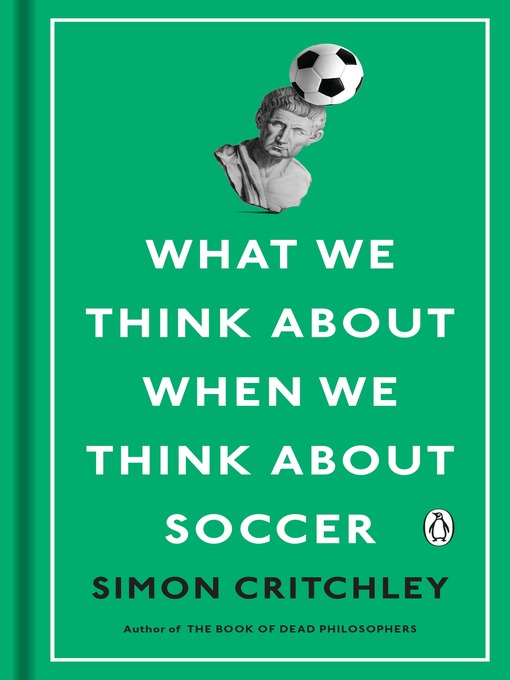
What We Think About When We Think About Soccer
کتاب های مرتبط
- اطلاعات
- نقد و بررسی
- دیدگاه کاربران
نقد و بررسی

September 1, 2017
An exploration of why soccer is beautiful and how its beauty (and occasional ugliness) manifests.Critchley (Philosophy/New School for Social Research; ABC of Impossibility, 2015, etc.) is a passionate soccer fan. Though he is a supporter of Liverpool in the English Premier League, his commitment to the game extends far beyond club and country. He has written a number of books geared toward bringing a philosophical eye to popular topics, and here he tackles perhaps the most popular of all with wit and verve. The author is not attempting a "philosophy of football" per se but rather an exploration of the "phenomenology" of the game--i.e., "the description of what shows itself to us in our everyday existence." This might initially seem like jargon to some readers, or a distinction without a difference, but to those who allow Critchley leeway, this slim book will provide many pleasures. For one thing, while the author is a deeply devoted fan, he is not a blind one. He acknowledges many of the problems that come with being a fan of sports in the modern day: the excesses, the racism, violence, sexism, and hypermasculinity, the insane amounts of money at the highest level of the game. He is aware of some of the innately stupid (his word) aspects of being a soccer fan, but he is also aware of the intellectual aspects to the game. Even with the philosophical nature of the book, it is successfully aimed at a nonacademic audience. Furthermore, Critchley peppers the book with compelling photographs from the history of the sport that also help illustrate and give life to the narrative. Naturally, soccer fans will get more out of this book than fans of other sports, but anyone who is passionate about a game and is willing to read a smart assessment of what it means to be a fan will find much to admire.
COPYRIGHT(2017) Kirkus Reviews, ALL RIGHTS RESERVED.

October 1, 2017
Critchley (Hans Jonas Professor of Philosophy, New Sch. for Social Research; ABC of Impossibility) is a widely published British philosopher whose 20-plus works cover the history of philosophy, ethics, religions, and the arts. This latest book is his first venture into the world of sports and soccer; a rambling collection of thoughts about the philosophy of being a soccer fan, not the philosophy of sport. The author's crisp style, biting sense of reality, and love of the game blend into a "thoughtful poetics of soccer." Readers seeking a book about games, players, and historic matches should look elsewhere. What Critchley achieves here is an introspective look into soccer as an experience and a personal philosophy. Nowhere are the author's reflections more evident than in his chapter on French star Zinedine Zidane, a player unequaled on and off the pitch. Zidane's exploits are heroic and tragic and a significant part of soccer history. VERDICT Some readers may be disappointed in Critchley's application of philosophical thought to soccer; however, many will delight in the beauty of soccer as art and life.--Boyd Childress, formerly with Auburn Univ. Libs., AL
Copyright 2017 Library Journal, LLC Used with permission.

Starred review from October 23, 2017
In this irresistible treatise on how soccer came to be the dominant sport around the globe, Critchley (The Book of Dead Philosophers) weds insights gleaned from a career studying Continental philosophers to his observations and experiences of soccer managers, players, fans, and even his own family. He ties the sport to politics by beginning with a chapter titled “Socialism” before going on to establish what he calls a “poetics of soccer.” He writes, “What is taking place in an organized team is a never-ceasing dialectic between the associative, collective activity of the group and the supportive, flourishing individual actions of the team.” Critchley’s depth and range of knowledge is remarkable. As his protagonists, he uses philosopher Martin Heidegger and Liverpool manager Jurgen Klopp, men both obsessed with “the moment” and the movement of history through “situations” (terms used in Heidegger’s writing). Critchley addresses head-on the “contradiction between the form of football, as association, socialism, and collective praxis, and the material content of the game, which is money, in its most excessive and grotesque manifestations.” For him, this contradiction creates a philosophical conundrum: How can world soccer be dominated by the fans and the oligarchs at the same time? Critchley’s incisive philosophical meditation will help readers rethink their relationship to soccer.

























دیدگاه کاربران